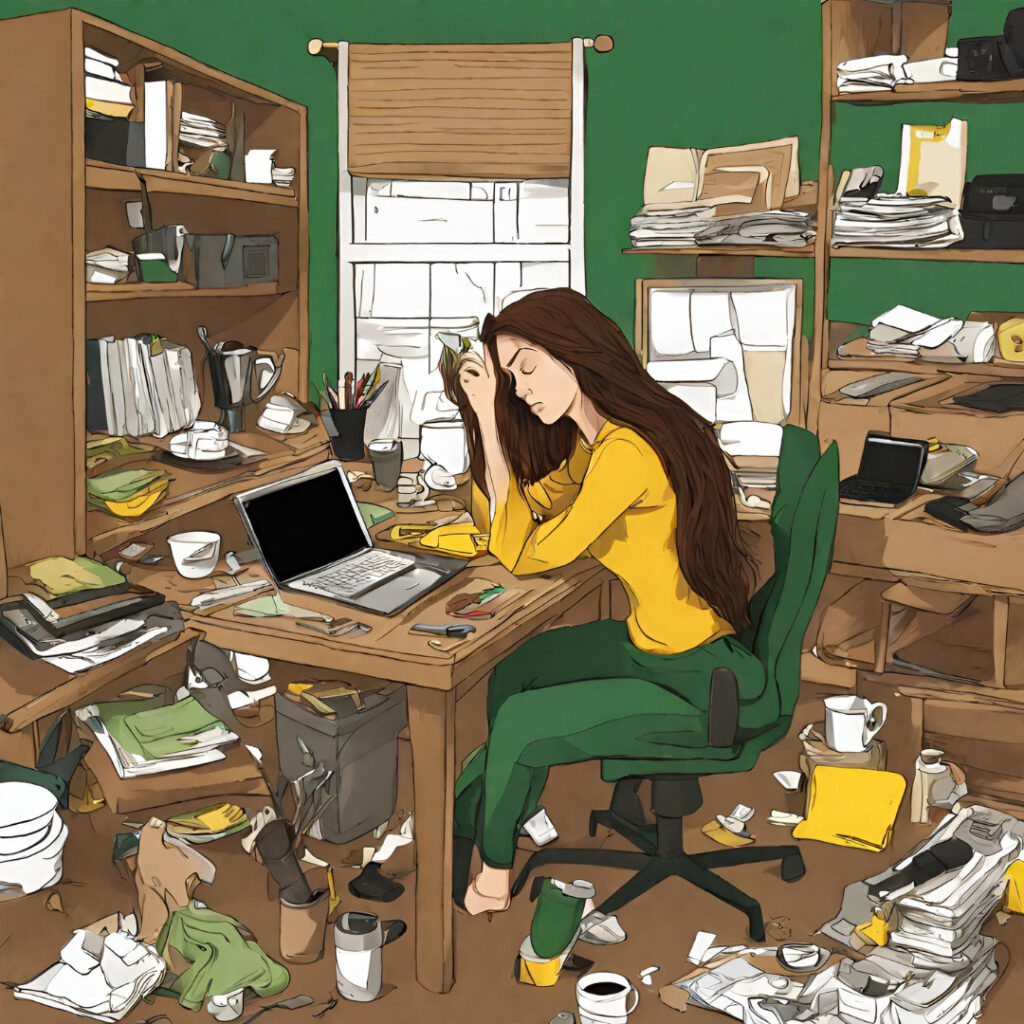Let’s start a journey together. A journey to break free from the overwhelming stress of toxic productivity and rediscover a balanced and fulfilling life.

Toxic productivity impacts you more than you probably realise. Here we talk about what it is, how to recognize the signs and pull back the layers to understand why it has overtaken your life. That is to say, this is your guide to help you identify the impact toxic productivity has on your mental health and relationships. These are crucial steps before you can truly understand and overcome it.
Join us in navigating a path toward a life where you’re in control, free from the burdens of endless tasks. It’s about taking a step back to breathe and live more meaningfully.
Understanding Toxic Productivity
Exploring toxic productivity, especially in the workplace, reveals a culture that has a significant impact on your wellbeing. This toxic mindset thrives on constant output, unrealistic expectations, and a neglect of personal wellbeing. Mistakenly, many people link long working hours to greater personal value. As a result, we find ourselves in an environment lacking care, balance, and sustainability.
“Toxic productivity is the result of a commitment to perfection, relentless planning, and an obsessive pursuit of effort without balance.”
Unknown
Toxic Busyness vs. Toxic Productivity
Understanding the difference between toxic busyness from toxic productivity requires self-reflection.
Toxic busyness is constant activity. However, there is no clear productivity or meaningful outcomes. As a result, this frequently leads to burnout. Poor time management and a difficulty in setting boundaries are common contributors.
Comparatively, toxic productivity involves an unhealthy fixation on output and achievement. Personal wellbeing takes a back seat. Consequently, this often leads to stress and feelings of inadequacy. External pressures and a culture that overly prioritises constant achievement fuels the toxic productivity flames.
Consequently, engaging in self-reflection is key to recognising the differences between toxic busyness and toxic productivity. This awareness is vital for fostering a healthier approach to work and life. It emphasises the importance of striking a balance between productivity and overall wellbeing.
The Web of Toxic Productivity in the Workplace
Does your workplace encourage toxic productivity? In order to find out, we need to understand the sources of toxicity. This could be internal or external, or both. To clarify, identifying the source is crucial to create targeted strategies for a healthier workplace.
Sometimes, you can tell if a workplace is not so great. It might have bad leaders, problems with communication, and a vibe that’s more about competing than working together. These are external factors.
Comparatively, to find internal factors we need to look within. For instance, it could be striving to be and do everything perfectly or not setting clear boundaries. These tend to make the problem worse.
As you can see, external and internal factors overlap which complicate the issue. Therefore, in order to create working environments that focus on wellbeing as much as productivity, we need to understand these factors and keep the sources in mind.
What is productivity anxiety?
Always working or putting work first leads to toxic productivity. As a result, this makes people less happy with their jobs and strains their relationships. In this situation, people also often struggle with ‘productivity anxiety’. This means that they constantly worry or feel guilty about not meeting expectations, which encourages the cycle of overwork.
Consequently, this adds a lot to the problem of toxic productivity. It creates a harmful cycle that keeps going because people praise endless productivity. Despite this, to stop this cycle, we need to rethink what society values. We need to acknowledge that wellbeing is just as important as doing well at work.
Is your to-do list fuelling toxic productivity?
When we are always trying to strive for the next goal, the never-ending cycle of productivity turns into an endless list of things to do. As a result, this list feels like a big mountain that never gets smaller. Therefore, you have very little room to take a break, do activities that you enjoy and nurture relationships.
We invite you to reflect on these questions:
- Is your to-do list a source of stress? Does each task feeling like a mountain that must be conquered?
- How often do you allow yourself the luxury of slowing down? Do you give yourself time to enjoy a moment of rest and calm, despite the chaos?
- Who is creating your to-do list? Is it you, your workplace, someone else?
- Who is setting the priorities for those tasks? Do activities that you enjoy always get pushed to the bottom of the list or maybe they don’t make the list at all?
- How are those priorities determined? If everything is urgent then nothing is urgent.

“The grasp of toxic productivity culture confines us to our to-do lists, stealing away the freedom to truly live.”
Unknown
Toxic productivity’s Impact on Your Wellbeing and Mental Health
You need to understand that your wellbeing is very important. Therefore, come with us on a journey where your health comes first, and your hard work gets the recognition it deserves. Comparatively, in places filled with toxic productivity, you might notice signs like always wanting to work, feeling guilty about taking breaks, or thinking your value is only based on how much you get done.
Also, looking at the emotional side of toxic productivity shows how much it can affect mental health. Non-stop working can break the close connection with your inner self. Have you ever been so busy for so long that it feels like you’ve forgotten who you truly are? This toxic cycle becomes a kind of comfort zone. It numbs feelings and takes attention away from the real problems. People often realize this only when they face serious physical or mental health problems.
“In the pursuit of constant productivity, we often lose sight of the value of rest and the joy of being present in the moment.”
Unknown
Toxic productivity leads to burnout. That is to say, if you always feel tired and anxious, it might mean you are on the edge or that balance is off. Ignoring rest or struggling to relax during breaks is a common sign. As a result, productivity turns into something people feel they have to do all the time. It’s like a desperate effort to keep their emotions in balance, however this can only last so long.
Think about this:
- Have you ever feel like your successes, no matter how significant, get overlooked because the focus quickly shifts to the next thing?
- Do you continuously find things to do and choose not to relax?
Signs of toxic productivity
The trap of toxic productivity shows up in different ways. For example, someone might ignore their own wellbeing, put family aside, or give up other parts of life just to keep being super productive. The first important step to getting a healthier balance is realizing these patterns.
Here are 5 ways that you might see toxic productivity appearing in your life:
1. Guilt for Taking Breaks
Ever feel bad about taking breaks? It happens when a restful moment turns into stress. In a world that loves constant work, taking time off can make you feel guilty. You might wonder if you should be doing something more useful. But breaks are super important! They’re not laziness; they help you stay energised and creative. Instead of feeling guilty, think of breaks as self-care moments. They’re not a detour but a key part of your journey, giving you the energy to handle whatever comes your way.
For instance, have you found it hard to enjoy lunch without thinking about all the things you still need to do? It’s like the good stuff about taking a break gets lost in the stress.
2. Relentless urge to work
Work doesn’t always stay at work – it often mixes with your personal life. You might always feel like you should be doing something to reach your goals. This makes it hard to relax and enjoy hobbies. The pressure to succeed at work can make it tough to fully unwind, and it can even affect how much you enjoy your free time. The constant feeling that you should be working can take away the joy of doing things you love.
For example, have you ever struggled to focus on a hobby because work thoughts keep popping up in your mind? Me to. The problem is that this compromises the quality of your experiences.
3. Tying Self-Worth to Productivity
When you only think your value comes from what you do, it can make people forget how awesome you are just for being you. It’s not just about what you achieve; it’s also about your kindness, resilience, and all the cool things that make you, well, you. If everyone only sees your worth in terms of what you get done, they might miss out on the great qualities that make you special. It’s essential to see yourself in a more complete way, appreciating not just your achievements but also the fantastic person you are, beyond the things you do.
Think about a time when you felt your worth was only about what you achieved. How did it make you feel about yourself?
5. Competitive Relaxation
When you work a lot, trying to relax can feel like you’re competing against yourself. This turns taking a break from something enjoyable into a stressful situation. The constant need to do better or meet high standards can make even relaxation time feel like a contest with yourself. But here’s the thing: taking a break should be about feeling good, not about beating your own records. It’s important to remember that relaxing is not a competition. By letting go of the need to compare and just allowing yourself to unwind, you can actually enjoy the real benefits of taking a break and make it a positive part of your routine.
Have you turned a simple activity into a personal challenge? How did it affect your ability to relax?
Self-reflection: Recognize toxic productivity in your life
Spotting these signs is like a guide to break free from toxic productivity. When you notice them, it’s a cue to rethink how you handle work, productivity, and your wellbeing. Each time you catch these signs, think of it as a chance to step back and consider if your current path is good for your mental health. It’s like a little nudge toward a healthier and more balanced life. So, pay attention to these signals and make small changes to create a life that values not only getting things done but also making sure you feel good and happy overall.

A Call for Change
Reflecting on the Relentless Pursuit
The never-ending cycle of being toxically productive can only last for so long before something has to give. Think about your own experiences in the constant busyness of our daily lives.
Do you feel caught in a flow of tasks that never seem to end?
Are you always reaching for an ideal that seems just out of reach?
This is a common challenge in a society that highly values constant achievement and being super productive.
External and Internal Pressures of toxic productivity
Take a moment to think about your own experiences and uncover the roots of toxic productivity. These roots are usually hidden below the surface.
Does work or what people expect make every moment feel like it must be busy? On the other hand, do personal things, like wanting everything perfect or having a hard time setting clear limits, add to always being busy.
This isn’t about blaming anyone; it’s about figuring out what’s going on in our lives. It’s a chance to see patterns that make us feel too busy and tired. By noticing these things, we can take intentional steps to break free from the cycle of working too much.
Pivotal Reflection Moment
Think of this moment as a pause button in your busy life. Imagine it like taking a break, not from doing stuff, but from all the things that keep piling up. Now, think about how you can make things better for yourself. Maybe it’s setting clear limits so you’re not overwhelmed, or finding joy in quiet moments. And, here’s a big one: don’t believe that your value is only about what you achieve. Your well-being is about more than just getting things done—it’s about enjoying life too.
First off, think about setting clear limits. These are like safety lines to make sure your mind and body stay healthy. It’s like saying, “Hey, I can do this much, but I also need time for me.” Picture having moments in your day just for yourself, away from all the noise and tasks.
Next, try to enjoy quiet moments. In a world that’s always loud, finding peace in silence can be a superpower. Imagine those moments when you can just breathe and relax, letting go of stress. It’s in these quiet times that you might discover a sense of calm and understanding about yourself.
Lastly, don’t believe the idea that your worth is only about what you do. Sure, getting things done is great, but your value goes beyond checklists. Think about the good things in you—your kindness, your connections with others. Your well-being is not just about ticking off tasks; it’s about having a life that feels good inside. So, let this moment be more than just a quick thought. Let it guide you to a life where you balance getting things done with taking care of yourself.
Breaking Free from toxic productivity for a Balanced Life
To break free from the never-ending cycle, you need to choose to prioritize wellbeing. It’s realizing that true success is more than just always being really productive.
Picture a life where achievements are celebrated and quiet moments are treasured. Further, it’s a life where the pursuit of an ideal is balanced with a real care for your overall well-being.
Unravelling the Origins of toxic productivity: A Personal Journey
As someone who sets big goals and works hard, I fell into the bad cycle of working too much. Even though I accomplished many things, stress was always there. It pushed my limits and hurt my health. The constant need to be productive took over everything. Even my free time became about getting more things done instead of just relaxing.
“Toxic productivity is like a mirage – the more you chase it, the farther it seems, and the more exhausted you become in the process.”
Haemin Sunim
I finished school, worked, got married, and had kids. People saw me as a super mom and high achiever, but I wasn’t balanced. I was too focused on my career, and it took over everything. A bad work environment made it worse. So, I changed jobs, hoping for a better place. At first, the new job helped, but it started taking over my life too. Now, I see that being super productive has a harmful side, and I played a part in it. This realization is making me think I need to change how I approach things.
A World Beyond Constant Hustle
As I continued with my always-busy and productive schedule, I wish for a world that values the beauty of a simpler, more basic life. However, my love for numbers, tracking, and data sometimes becomes an obsession. Doing simple things to take care of myself feels hard because they don’t match the fast pace I’ve gotten used to. However, I have come to a point that I recognise the sources and issues of toxic productivity in my own like and now I can work to make a change.
Conclusion: Navigating Life’s Path
In life’s journey, dealing with toxic productivity is more than just about culture—it really affects how we feel. Chasing a hard-to-reach ideal, tied to always being busy, is like a mirage, pulling us away from what life is really about.
Signals for Change
Starting on this journey, often without realizing it, takes a toll on mental health, relationships, and overall satisfaction. The signs of toxic productivity aren’t just warnings. They’re signals urging us to rethink how we connect with work, personal life and overall well-being. Signs like feeling guilty during breaks, always wanting to work, and finding it hard to relax are things you can now notice.
This reflection gives us a chance to free ourselves. It’s important that we recognize what contributes to our feelings of overwhelm and exhaustion. These signs serve as a guide, leading you toward a healthier, more balanced life.
Unveiling Origins
Our call for change recognizes the need for both outside and inside changes. It’s crucial to reshape workplace cultures, and it’s equally important to understand the personal forces pushing us into the never-ending cycle of busyness.
Our personal journey reveals where toxic productivity comes from, tracking it back to societal pressures, inner struggles, and situations that may seem harmless. This awareness becomes a catalyst for change—a realization that empowers us to take intentional steps toward breaking free from the toxic cycle.
Envisioning a Balanced Life
As we wrap up this exploration, imagine a life where accomplishments are celebrated, moments of stillness are valued, and the pursuit of an ideal is balanced with genuine concern for overall well-being.
Choosing to break free from the chains of toxic productivity is a deliberate decision, a commitment to prioritize well-being over constant productivity.
In this quest for balance, take a moment—a break in the constant flow of tasks and obligations. Imagine changes for a healthier balance between productivity and wellbeing. The journey toward a more balanced and fulfilling life starts with a single, intentional step—a step acknowledging the importance of thriving in life’s intricate journey.
Join us in embracing this harmonious journey of life, where productivity isn’t a never-ending chase but a balanced part of a fulfilling existence. Take control of your time and energy, fostering a healthier relationship with productivity and well-being. The journey may be challenging, but the destination is a life where we thrive in the intricate dance of life

If the above resonates with you, but you need one on one assistance to get through this time, consider sending an inquiry to Online Psychologists Australia (or equivalent in your location).
Find out more about Plant and Pause here.


WOW just wyat I was looking for. Came here by searching for odessa forum https://zeleniymis.com.ua/